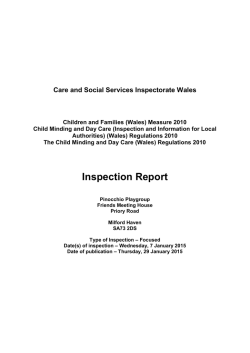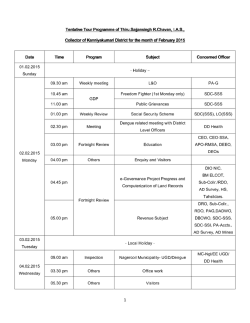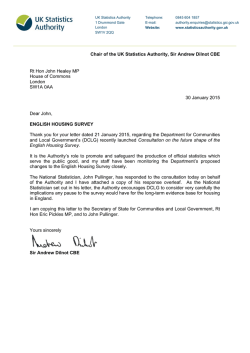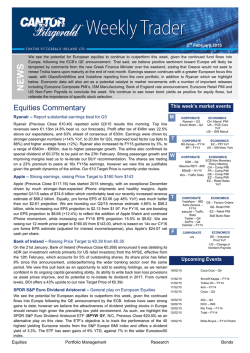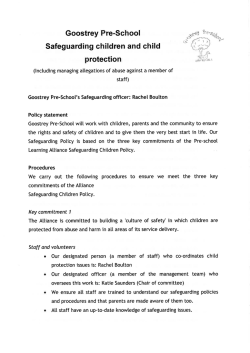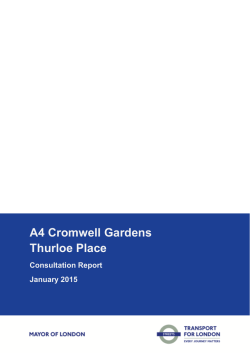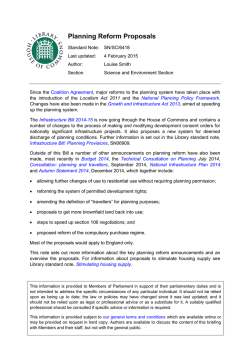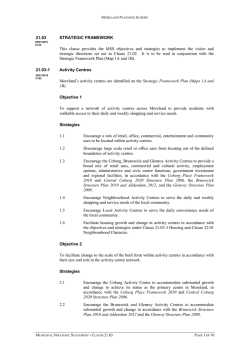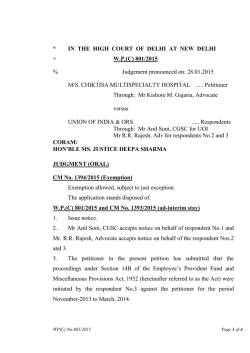
Strategic Plan 2013–2015 - Mental Health Commission
Mental Health Commission Strategic Plan 2013–2015 Contents Chairman’s Foreword 2 Who we are and What we do 3 Introduction 3 Our Vision, Our Mission 4 The Broader Environment and the Challenges we are Facing 5 A Vision for Change 5 Wider Health Service Reform 6 Mental Health Act Review 7 Assisted Decision-Making (Capacity) Bill and the Convention on the Rights of Persons with Disabilities 7 Public Service Agreement 7 Economic / Social Environment 8 What You Told Us 9 Our Core Activities and our Strategic Priorities 10 Our Strategic Priorities 11 How we will deliver on our Plan 12 ‘Key Enablers’ 12 Our Values 13 Bringing it Together 13 Our Strategic Map 2013–2015 14 The Wider Environment 15 Our Planned Activities - What we Intend to Achieve in 2013 to 2015 16 Chairman’s Foreword This is the fourth Strategic Plan of the Mental Health Commission and covers the period 2013 – 2015. The Strategic Plan has set out our four Strategic Priorities for the coming three years, these include: A Strategic Plan is an important guidance document that informs and directs the work of the Commission. (1) Safeguarding human rights and incorporating these principles in all our work This Plan has been drawn up against a backdrop of Public Sector Reform, the contraction of Public Sector expenditure and the requirement that services are maintained at the current level. (2) Supporting the development of high standards and good practices in mental health services and promoting good quality care (3) Promoting service user-centred and recovery oriented services The implementation of A Vision for Change continues to be a priority for the Mental Health Commission. Presently, the Mental Health Act 2001 is under review and the Commission expects significant changes to arise from the review. (4) Strengthening the profile of the Mental Health Commission and mental health services. In my role as Chairman, I look forward to working with the Mental Health Commission Members, the Commission Executive and staff to achieve the priorities outlined for the period 2013 – 2015. I wish to extend my thanks to the Department of Health for their continued support and assistance and also my appreciation and thanks to all the Commission’s stakeholders for their commitment and support of the organisation. The specific challenges for the Mental Health Commission over the next three years include: • Providing the same level of service required under the provisions of the Mental Health Act 2001, with continued diminishing resources • Supporting the maintenance and improvement of mental health care and treatment services across the country against a background of depleted resources, despite recent additional revenue allocations in 2012 and 2013. • Promoting and supporting the full implementation of ‘A Vision for Change’. • Participating in and responding to changes in mental health legislation, specifically the Mental Health Act 2001 John Saunders Chairman May 2013 • Anticipating the expected Assisted Decision Making (Capacity) legislation and ratification of the Convention on the Rights of People with Disabilities, which will underpin an important human rights framework for people with mental health difficulties • The development of a meaningful and impactful public profile of the Mental Health Commission and its responsibilities and activities. 2 Who we are and What we do Introduction This is our fourth strategic plan. We have placed a heavy emphasis on our core activities in this plan so that we can effectively fulfill our legal mandate in a time of increasing economic challenge. We will continue to operate a responsive regulatory approach to mental health service provision for the next three years through our monitoring and enforcement activities. We will use our statutory powers to promote high quality care. We remain committed to placing service users, families and carers at the centre of mental health care at all times and promoting a recovery ethos within Irish mental health services. We will continue to utilize our statutory remit to leverage the further development of community mental health services. One in four people will experience mental health problems in the course of their lives. A small percentage of persons affected will require access to mental health services to address their mental health needs. The Mental Health Commission is responsible for regulating and monitoring these services. The Commission was established in 2002. We are an independent body and our functions are set out by law in the Mental Health Act 2001. Our main functions are to promote, encourage and foster high standards and good practices in the delivery of mental health services and to protect the interests of patients who are involuntarily admitted. There are a variety of types of mental health services which are provided in both in-patient and community settings. Services include general adult mental health services, as well as mental health services for children and adolescents, older people, people with intellectual disabilities and forensic mental health services. Concerns were raised in our consultation on this strategic plan about how quality care can be maintained in services with diminished resources. Our challenge will be to work with services to assist them in the continued delivery of good outcomes for service users. We will also continue to enhance our profile and that of mental health services and push for continuous improvement in these services. We also have a number of additional responsibilities set out in legislation. These include: • Appointing persons to mental health tribunals to review the detention of involuntary patients and appointing a legal representative for each patient; • Establishing and maintaining a Register of Approved Centres i.e. we register inpatient facilities providing care and treatment for people with a mental illness or mental disorder. • Making Rules regulating the use of specific treatments and interventions i.e. ECT (Electroconvulsive Therapy), seclusion and mechanical restraint; and • Developing Codes of Practice to guide people working in the mental health services. 3 Our Vision Working together for quality mental health services. We will continue to work collaboratively with our stakeholders to create this shared vision and deliver real change in our mental health services. We will continue the alignment of strategies and processes in the mental health domain with the aim of achieving quality mental health services. Our Mission Our mission is to safeguard the rights of service users, to encourage continuous quality improvement, and to report independently on the quality and safety of mental health services in Ireland. 4 The Broader Environment and the Challenges we are Facing A Vision for Change There is significant overlap between A Vision for Change and the Commission’s Quality Framework for Mental Health Services in Ireland, which specifies Ireland’s standards for mental health services. We intend to focus greater efforts on implementation of the Quality Framework during the lifetime of this plan which will involve addressing issues such as multidisciplinary team working, access to services and the availability of therapeutic interventions. A Vision for Change is Ireland’s national mental health policy and was published by the Department of Health in January 2006. The policy describes a comprehensive framework for refocusing services from old-style institutional care to a communitybased model. To-date policy implementation has been slow and this was continually highlighted by the Independent Monitoring Group which was tasked with assessing progress on realising the recommendations of A Vision for Change. The Commission has continued to emphasise that a streamlined structure with proper governance by way of a separate, semi-autonomous Mental Health Services Directorate within the Health Service Executive is required if the policy is to be effectively implemented. For HSE services, the introduction of the clinical care programmes for mental health which are due to be implemented in 2013 are to be welcomed as they will focus services on both process and quality improvement. The Commission has used its statutory powers to prompt the closure of a number of approved centres. This followed several years of reports by the Inspector of Mental Health Services highlighting the outdated nature of many of these facilities. We have attached conditions to the registration of others. This has helped to reduce the number of beds in old style institution from 1,352 at the end of 2009 to 394 in January 2013. Yet, the positive impacts of closing such facilities can only be fully realised when appropriate community based services are also in place. The work of the second Independent Monitoring Group concluded in June 2012 and it has not been replaced. The current absence of any independent monitoring of A Vision for Change needs to be addressed urgently. During our consultation on this strategic plan, our stakeholders shared their concerns and frustration regarding a number of aspects of A Vision for Change. They noted the slow rate of development of community services in particular, the absence of the required number of fully developed multi-disciplinary teams, and the difficulties that vulnerable groups such as children and people with intellectual disabilities have accessing appropriate services. Various other specialist services, such as forensic services, services for older people and rehabilitation and recovery services have also seen little development since A Vision for Change was published. 5 Wider Health Service Reform The government has also indicated that in time, it will consider merging the appropriate regulatory functions of the Commission with those of HIQA (Health Information and Quality Authority) which is responsible for regulating health services other than mental health services. The government has also indicated that consideration will be given to transferring other functions of the Commission to a newly established Patient Safety Agency. The Programme for Government promises the most fundamental reform for our health services in the history of the state. Published in 2012, Future Health – A Strategic Framework for Reform of the Health Service 2012 – 2015 details the actions that will be taken to deliver on this promise. Future Health focuses heavily on the move towards a universal health insurance (UHI) funding model of healthcare. Under this funding model, there will be a mandatory requirement for every person in Ireland to have health insurance cover. Such cover will be provided by a choice of insurers. The cost of premia will be based on the ability to pay. The Commission awaits the outcome of a critical review of the organisation which was scheduled to be completed by June 2012. The Department of Public Expenditure and Reform indicated that this review was delayed due to external factors. The Commission anticipates that such a comprehensive review will inform the government’s decisions regarding the future of the Mental Health Commission. Having regard to all of our statutory functions, the Commission will continue to monitor all developments related to the reform of the health services and engage with relevant stakeholders as appropriate. The first phase of the process will deliver a greater degree of accountability for the HSE to the Minister for Health. It includes the abolition of the Board of the HSE, the establishment of a Directorate and a new management structure in the HSE. Hospital groups will be established on an administrative basis with Group Chief Executives having budgetary and staff responsibility for both the HSE and voluntary hospitals in their group. The first phase will also see the establishment of a new Child and Family Support Agency. The Mental Health Commission notes the commencement of these changes in 2013. 6 Mental Health Act Review Assisted Decision-Making (Capacity) Bill and the Convention on the Rights of Persons with Disabilities The Mental Health Act 2001 was fully commenced in November 2006. This brought Ireland in line with meeting our obligations under international human rights conventions. Last year, the Department of Health commenced a review of the legislation and published an Interim Report on the Review of the Mental Health Act 2001 in June 2012. One of the report’s key recommendations was that ‘a rights based approach to mental health legislation should be adopted going forward’. This represents a shift from what stakeholders mainly viewed as the paternalistic interpretation of the provisions of the 2001 Act and the Commission is very supportive of such an approach. The Commission has continued to highlight the urgent need for capacity legislation to be enacted and the need for compatibility between any amended mental health legislation and new capacity legislation. The Commission welcomes the commitment outlined in the Programme for Government to introduce an Assisted Decision-Making (Capacity) Bill. The Department of Justice published an outline of the Capacity Bill in 2008 but there have been delays in bringing forward a Bill before the Oireachtas. Until such time as capacity legislation is introduced, Ireland cannot ratify the Convention on the Rights of Persons with Disabilities. Once enacted the Commission will also support the implementation of Assisted DecisionMaking (Capacity) legislation. Minister for Disability, Equality, Mental Health and Older People, Ms Kathleen Lynch TD, subsequently established an expert group to undertake the second phase of the review. The Commission is represented on this Expert Group which is scheduled to complete its work in March 2013. Our strategic plan is based on the existing legislation as it is unlikely that any major changes to the Act will occur in the short term. We will, however, fully support the roll out of any amended legislation. Public Service Agreement The aim of the Public Service Agreement 2010 – 2014, otherwise known as the Croke Park Agreement is to ensure that the Irish Public Service continues its contribution to the return of economic growth and economic prosperity to Ireland while delivering excellence in service to the Irish people. Throughout the public sector, efficiencies need to be maximized and productivity in the use of resources greatly increased through revised work practices and other initiatives. 7 Economic / Social Environment The Inspector of Mental Health Services has reported that the unprecedented rate of retirement of staff in mental health services is adversely affecting the provision of community mental health services. The Moratorium on Recruitment and Promotion in the Public Service means that most of these staff cannot be replaced. The Commission is seriously concerned that the continued loss of staff from mental health services will lead to the withdrawal of staff from community services to approved centres. It is the Commission’s view that the opportunity to reconfigure staffing to provide multidisciplinary community mental health teams must not be lost. The current environment requires the Commission and all key stakeholders in the area of mental health to work together to come up with new and innovative solutions so that we can deliver real changes in mental health services. Ireland has experienced severe economic difficulties since 2008. The economic impact of mental health problems is considerable. A study published by the Commission in 2008 estimated that the overall cost of mental health problems in Ireland was just over €3 billion in 2006, which was equivalent to 2% of GNP. The current economic situation for mental health service providers has been characterized as a “doubleedged sword”, whereby service providers confront the prospect of diminishing resources together with increased demand. The Commission considers that it is especially important that mental health services are protected from the impact of cuts in funding and we will work to help protect resources required to deliver quality mental health services. The Commission welcomed the special Governmental allocation of €35 million which was provided for in 2012 primarily to further strengthen Community Mental Health Teams in both adult and children’s mental health services. We were disappointed that the filling of the required posts was then delayed until December 2012, but welcome the fact that this money appears to have been preserved, and in addition to the €35 million allocated for 2013 means that €70m is now allocated for spending on community mental health teams in 2013. This allocation of additional funding will assist the expansion of activities in the areas of suicide prevention, initiate the provision of psychological and counseling services in primary care, specifically for people with mental health problems and facilitate the re-location of mental health service users from institutional care to move independent living arrangements in their communities. The 414 posts approved to implement this package of measures was also welcomed by the Commission. From a social perspective, it is acknowledged that the burden of stigma and discriminatory practices experienced by people with a mental illness can prove to be a greater barrier to recovery than having a mental illness itself. The mistaken belief that a person with a mental illness will not recover from the illness reinforces the stigma. Mental health service delivery must be firmly based on the concept and practice of recovery. 8 What You Told Us The Commission is committed to collaborative working and to sustaining relationships that we have built since our establishment. Therefore, as part of the process of developing our strategic plan, we ran a consultation exercise. We asked you key questions about the future direction the organisation should take and activities we need to focus on. We have listened to what people told us and these views are reflected in the activities we have planned for the next three years. We had to be mindful at all times when including activities, of our remit as outlined in the ‘Who we are and what we do’ section. Particular priority areas you raised were: - Having a stronger role in creating cultural change, “push for improvements in mental health services nationally” - Having a stronger advocacy role and “keeping mental health at the top of the political agenda” - “Ensuring that the rights and needs of individuals with mental health difficulties are placed before economic considerations” and “investing corporate energy to ensure the provision and protection of resources required to deliver a quality mental health service”. It is also worth highlighting a number of key themes which arose in the consultation. - Highlighting the impact of the economic crisis on mental health services “monitor impact of budget cuts and staffing reductions on mental health service delivery” and current challenges faced by services “advocate for essential staffing, resources, training and buildings to operate quality services”. You said that we had “introduced a level of accountability that was previously lacking in mental health services”. You said that many of the initiatives and programmes in our previous strategy “continue to remain appropriate within an evolving mental health service” and that ultimately “the next strategic period should be one of consolidation, strengthening and development”. - “Ensuring A Vision for Change is not de –prioritised”. - “The promised new legislation… should be a high priority for the Commission.” However, you said we also need to raise our profile in the public domain and be more visible and accessible. “The MHC needs to be more visible to service users themselves and needs to ensure that everyone who uses mental health services knows and understands their rights” . - “the monitoring of services throughout the country is vital and…should not be impacted upon due to limited funding”. - Further embedding a culture of recovery as a guiding principle and “championing a transformation of understanding about recovery” Concern was also expressed that “there is a risk that the Mental Health Commission will be merged with HIQA or another agency. This would have a very negative impact on its independence and on mental health services in general”. - Continuing to strengthen the engagement of “service users and carers at all levels of service governance and provision” - “Work with others to achieve high standards” You also highlighted the real challenges faced by the Commission in the current economic climate of trying to maintain quality within services with less and suggested, amongst other things, “the development and implementation of new initiatives through engagement with all interested parties working together to achieve a shared objective”. 9 Our Core Activities and our Strategic Priorities Core Activities By law, we must focus our work programme on the following five core activities. Focusing on these activities will enable us to fulfill our legal mandate and achieve our mission. These five core activities run through our strategic plan and are connected to all of the priorities we have identified. They link to a variety of activities we will undertake and the outcomes associated with those activities. Our Core Activities Registration and Enforcement Registering approved centres. Inspection Inspecting approved centres and community mental health services. Enforcing associated statutory powers e.g. attaching conditions. Regulation Reporting on regulatory compliance and the quality of care. Developing and reviewing rules under the Mental Health Act 2001. Quality Improvement Developing standards, codes of practice and good practice guidance. Monitoring the quality of service provision in approved centres and community services through inspection and reporting. Using our enforcement powers to maintain high quality mental health services. Independent Reviews Mental Health Tribunal Reviews Administering the independent review system of involuntary admissions. Legal Aid Scheme Administering of the mental health legal aid scheme. Safeguarding the rights of those detained under the Mental Health Act 2001. 10 Our Strategic Priorities These priorities are all outcome-focused as we recognize that our mission must be to move mental health services forward in a positive direction. This is in spite of the challenges faced in light of the current economic climate. We have identified four main strategic priorities for the coming three years based largely on the feedback from the consultation. 1 Safeguarding human rights and incorporating these principles in all our work We will act at all times to safeguard the rights of service users and incorporate human rights into all our practices. 2 Supporting the development of high standards and good practices in mental health services and promoting good quality care We will continue to set standards, promote good practice, review and inform on the quality of services, and facilitate the building of capacity within services through education and information. 3 Promoting service user - centred and recovery oriented services We will continue to work with services and service users, family and carer groups to promote services which are person- centred and recovery- oriented. 4 Strengthening the profile of the Mental Health Commission and mental health services We will increase understanding of our role and work collaboratively with others to maintain both the visibility of the Mental Health Commission and of mental health services in the public domain. 11 How we will deliver on our Plan ‘Key Enablers’ The effective and efficient governance of our internal systems and processes within the Commission are crucial to the successful delivery of our strategic plan. We have identified the following key enablers: Developing Our People We will develop our people in the Commission so that they feel valued, motivated and are equipped with the necessarily skills to deliver on our strategic priorities. Good Governance We will demonstrate good governance by continuing to review and assess internal systems, policies and processes to ensure they are effective and of high quality. Information and ICT We will publish and disseminate information online and in other formats that relates to our work. We will also maximise the use of information communication technology (ICT) to enhance our work and practices. Working in Partnership We will continue to collaborate and communicate effectively with our stakeholders (service users, families, carers, service providers and general public) and identify any new stakeholders to include in our work. EvidenceInformed Practice We will use available international and national evidence and research to underpin all of our regulatory practices and oversight activities. 12 Our Values Bringing it Together We will operate in a way that demonstrates the following core values in all our work: This strategic plan sets out our priorities and activities for the coming three years which will allow us to achieve our mission. In the following table and diagram, we summarize our strategic map for 2013 to 2015. We set out how our strategic priorities and core activities fit together to deliver on our mission. Central to this are the key enablers which we have identified above. Accountability and Integrity: We will operate at all times in a fair and transparent manner and take responsibility for our actions. You told us that you wanted to see a clear focus on outcomes in our work so we have included a list of outcome measures alongside each of our priorities and activities in our plan, which we intend on reviewing as part of our yearly business plans. We will monitor and assess our performance on these measures over the duration of the plan and report on outcomes in our Annual Reports. Dignity and Respect: We will show dignity and respect for those using services and those providing them. Confidentiality: We will handle confidential and personal information with the highest level of professionalism and we will take due care not to disclose information outside of the course of that required by law. Empowerment: Our goal is to empower stakeholders (service users, families, carers, service providers and general public) through our work. Quality: We aim to provide a quality service to all our stakeholders through use of evidence informed practices and by adopting a responsive regulatory approach. Recovery: Our work will be at all times oriented towards recovery, encouraging and focusing on strong, equal partnerships between service users, families and carers and service providers. 13 14 Key Enablers Core Activities Strategic Priorities Safeguarding Human Rights and incorporating these principles in all our work Promoting service user - centred and recovery focused services Strengthening the profile of the Mental Health Commission and mental health services Good Governance Regulate Effectively and maintain a robust governance framework within the MHC. Information & ICT Optimal use of ICT to carry out our work. Underpin our core activities with best available evidence. To deliver real change. Develop our people in the Commission so that they are valued, competent and motivated. Developing Our People - Safeguarding the rights of those detained under the Mental Health Act 2001. Evidence-Informed Practice - Using our enforcement powers to maintain high quality mental health services. - Monitoring the quality of approved centres & community services through inspection & reporting. - Developing standards, codes of practice and good practice guidance. Working in Partnership - Reporting on regulatory compliance and the quality of care. - Administration of mental health legal aid scheme - Administration of an independent review system of involuntary admissions. - Developing/ reviewing rules under the 2001 Act. - Inspecting approved centres and community mental health services. - Registering approved centres. - Enforcing associated statutory powers. Ie. attach conditions. Legal Aid Scheme Mental Health Tribunals Quality Improvement We will increase understanding of our role and work collaboratively with others to maintain the visibility of mental health services in the public domain. 4 Inspection We will continue to work with services and service user, family and carer groups to promote services which are person centred and recovery oriented. Supporting the development of high 3 standards and good practices in mental health services and promoting good quality care We will continue to set standards, promote good practice, review and inform on the quality of services, and build capacity within services. 2 Registration and Enforcement We will act at all times to safeguard the rights of service users and incorporate human rights into all our practices. 1 Our Strategic Map 2013–2015 Our Strategic Map 2013-2015 The Wider Environment s ight P Men rofi le tal He o al Qu al Impr ov it e P ra vic ri te ce ds nt ICT Go en re d er v ds & yo r- od Sche me se er eu co v Le g al Aid Info & c t i ce s e c ti on MHC sp al a M e nt n bu He a lt h Tri S er & re le Peop ls y t en m on ati r t is In R an m Hu & HC vices f M Ser th g Go ve rn an ce Re g g in ip rsh e n art P in Safe gu ard in W or k Mental Health Services i ce s H ig h St a n r da Evid ence-Informed practice Key Enablers Priorities 15 Core Activities Our Planned Activities - What we Intend to Achieve in 2013 to 2015 We intend to continue, enhance and carry out the following activities: Our Priorities What we will Do Outcome Measures for the Commission • Registration And Enforcement Regulation • Inspection • Quality Improvement • Mental Health Tribunals Independent Reviews • Legal Aid Scheme 1 Safeguarding Human Rights and incorporating these principles into practice 1.1 Organise a mental health tribunal for individuals involuntarily admitted in line with statutory timeframes. 1.1.1 100% of notifications received of involuntarily admissions will be acted upon. 1.2 Promote a rights-based approach to service delivery in line with international covenants and national legislation. 1.2.1 Our stakeholders acknowledge that a rights-based approach to service delivery is consistently promoted by the Commission 1.2.2 Publication and dissemination of an MHC ‘Seclusion and Physical Restraint Reduction Strategy’. “The Commission is well regarded as the independent watchdog for mental health services” “Safeguarding the rights of all individuals who are receiving care and treatment within mental health services” 1.3 Give express reference to human rights in all activities and publications to contribute to the wider public, political and professional awareness of human rights. 1.3.1 Our rules, codes of practice, guidance and other relevant publications consistently promote best practice in the area of human rights. 1.4 Contribute to the review of the 2001 Act and the review and development of related legislation including the Assisted Decision-Making (Capacity) Bill and assist with the implementation of such legislation. 1.4.1 Our contributions to the review of the 2001 Act are demonstrated through our submissions, representation on the Expert Group and other appropriate engagement. 1.4.2 Our contributions to the development and review of capacity and other relevant legislation are demonstrated. 1.4.3 The Commission act in accordance with any revised legislation to ensure the roll-out within the necessary timelines. 1.5.1 Appropriate training of mental health tribunal panel members is carried out. (what you told us in the consultation process) 1.5 Provide and co-ordinate education and training on mental health legislation in line with human rights as required and provide support and input to relevant training events. 16 Our Priorities What we will Do Outcome Measures for the Commission • Registration And Enforcement Regulation • Inspection • Quality Improvement • Mental Health Tribunals Independent Reviews • Legal Aid Scheme 2 Supporting the development of high standards and good practices and promoting good quality care Develop Standards and Good Practice 2.1.1 2.1 Review existing rules as required. 2.2 Review existing codes of practice and assess the need for additional codes of practice to guide services. 2.3 Develop knowledge of best practice internationally, including focusing on community care models and governance structures and share this knowledge. The rules on Section 59(2) and Section 69(2) are revised and published as statutory instruments. 2.2.1 & 2.3.1 Guidance and codes of practice are developed and & disseminated as appropriate to drive the delivery of evidenced based mental health services and interventions. 2.4.1 The Register of Approved Centres is maintained. “Finding a way that documents such as the Quality Framework, & the codes, rules & regulations become a part of everyday practice”. 2.4 Register approved centres in line with the requirements of the Mental Health Act 2001. 2.5 2.5.1 “The quality agenda should focus equally on outcomes for people attending services at outpatient level” Monitor approved centres through inspecting compliance with statutory requirements and assessing the quality of care. 100% inspection of approved centres. Inspection reports are published in line with the requirements of the Mental Health Act 2001. 2.6 Assess quality and standards in community mental health services through greater promotion of the Quality Framework for Mental Health Services. 2.6.1 A report of the quality of services in accordance with the standards for mental health services (Quality Framework) is published. 2.7 Monitor mental health care and treatment delivered in the community including day care, home care, community care and residential care. 2.7.1 Publication of relevant reports. (what you told us in the consultation process) Assess Quality 17 Our Priorities What we will Do Outcome Measures for the Commission • Registration And Enforcement Regulation • Inspection • Quality Improvement • Mental Health Tribunals Independent Reviews • Legal Aid Scheme 2 Promoting and supporting the development of high standards and good practices 2.8 Identify and share good practice nationally including examples of how compliance with regulations can be achieved. 2.9 Acknowledge innovative practice. “There is a need to 2.10 be more positive in the message of good practice”. We will use our enforcement powers where necessary to positively impact the quality of services. “An examination of all elements of mental health services and their role in supporting service users in achieving outcomes” Capacity Building: Education and Information (what you told us in the consultation process) 2.8.1 & 2.9.1 Good practice examples and examples of how compliance with regulations has been demonstrated are made available. 2.10.1 Approved centres have conditions attached to their registration or are removed from the register as appropriate. 2.11 Enhance awareness of existing and new Commission guidance, rules, and codes. 2.11.1 The Commission’s website is enhanced. 2.12 Continue our commitment to support capacity and partnerships for mental health services research. 2.12.1 Findings from existing research partnerships are reflected in our work. Data 2.13 Improve transparency of mental health services and influence practice through increased use and dissemination of data gathered. 18 2.13.1 Information on mental health service activity including outcomes is published. Our Priorities What we will Do Outcome Measures for the Commission • Registration And Enforcement Regulation • Inspection • Quality Improvement • Mental Health Tribunals Independent Reviews • Legal Aid Scheme 3 3.1 Promoting service user, families and carers - centred 3.2 and recovery focused services “the importance of the involvement of users and families in all aspects of care and service” Enhance the involvement of service users, families/carers and advocates in our work. 3.1.1 Service users, families/carers and advocates and service user groups are represented in our consultation, engagement and core activities. Promote service user, advocate and family/carer involvement in services and policy development. 3.3 Encourage services to seek the views of service users, their families and carers through use of surveys and other means. 3.4 “embedding a culture of recovery as a guiding principles into the 3.5 services.” Use plain English for all service user, family and carer information and produce information in other formats as appropriate to the activity. 3.4.1 Service users, families and carers are empowered through the provision of accessible information on the Mental Health Act 2001 and related activities. Monitor the provision of information as part of our regulatory activities to ensure that service users are fully informed of their rights. 3.5.1 The provision of information to service users is reported on. (what you told us in the consultation process) 3.6 Continue to report on recovery oriented 3.6.1 practice and highlight aspects of service provision that positively impact on recovery. 3.7 Promote a recovery approach to the delivery of services and identify ways recovery approach can be supported, maintained and achieved. 3.8 Include recovery principles in any training we provide or co-ordinate with mental health professionals and tribunal panels. 19 Information and examples of recovery are included in relevant Commission publications. Our Priorities What we will Do Outcome Measures for the Commission • Registration And Enforcement Regulation • Inspection • Quality Improvement • Mental Health Tribunals Independent Reviews • Legal Aid Scheme 4 Strengthening the profile of the Commission and mental health services 4.1 “Ensuring people 4.2 are aware of the Commission, the service and guides available.” (what you told us in the consultation process) 4.3 4.4 4.5 We will develop and publish a Communications Strategy. 4.1.1 Our profile and understanding of our role amongst the public is raised. We will publish information on our core activities on our website and in other formats. 4.2.1 The general public and our key stakeholders have a greater understanding of our role and functions. Develop Memoranda of Understanding with relevant agencies and regulators. 4.3.1 Partnerships with other regulators, state agencies and organisations in this and other jurisdictions are strengthened. Contribute to the debate on review of the Mental Health Act 2001 and other relevant legislation. 4.4.1 Our views on necessary reforms to mental health law and other relevant legislation are published. Highlight the importance of full implementation of A Vision for Change. 4.5.1 Commission publications reflect the importance of full implementation of A Vision for Change. 20 Mental Health Commission St. Martin’s House Waterloo Road Dublin 4 Ireland Telephone: +353 1 6362400 Facsimile: +353 1 6362440 Email: [email protected] Web: www.mhcirl.ie ISBN 978-1-907399-14-5
© Copyright 2026

